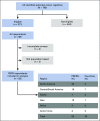Collection and Reporting of Indigenous Status Information in Cancer Registries Around the World
- PMID: 32031453
- PMCID: PMC6998012
- DOI: 10.1200/JGO.19.00119
Collection and Reporting of Indigenous Status Information in Cancer Registries Around the World
Abstract
Purpose: Worldwide, Indigenous people often have disproportionally worse health and lower life expectancy than their non-Indigenous counterparts. Despite the impact of cancer on life expectancy, little is known about the burden of cancer for Indigenous people primarily because of the paucity of data. We investigated the collection and reporting of Indigenous status information among a global sample of population-based cancer registries (PBCRs).
Participants and methods: An online survey was e-mailed to eligible registries using set inclusion criteria. Respondents were asked questions on the collection, reporting, and quality assessment of Indigenous status in their registers.
Results: Eighty-three PBCRs from 25 countries were included. Of these, 66% reported that their registry collected Indigenous status data, although the quality of this variable had been assessed in less than half in terms of completeness (38%) and accuracy (47%). Two thirds of PBCRs who collected Indigenous status data (67%), from nine of 25 countries responded that cancer statistics for Indigenous people were reported using registry data. Key barriers to the collection of Indigenous status information included the lack of data collection at the point of care (79%), lack of transfer of Indigenous status to the cancer registry (46%), inadequate information systems (43%), and legislative limitations (32%). Important variations existed among world regions, although the lack of Indigenous status data collection at the point of care was commonly reported across all regions.
Conclusion: High-quality data collection is lacking for Indigenous peoples in many countries. To ensure the design and implementation of cancer control activities required to reduce disparities for Indigenous populations, health information systems, including cancer registries, need to be strengthened, and this must be done in dialogue with Indigenous leaders.
Conflict of interest statement
The following represents disclosure information provided by authors of this manuscript. All relationships are considered compensated unless otherwise noted. Relationships are self-held unless noted. I = Immediate Family Member, Inst = My Institution. Relationships may not relate to the subject matter of this manuscript. For more information about ASCO's conflict of interest policy, please refer to
Open Payments is a public database containing information reported by companies about payments made to US-licensed physicians (
No potential conflicts of interest were reported.
Figures
Similar articles
-
Folic acid supplementation and malaria susceptibility and severity among people taking antifolate antimalarial drugs in endemic areas.Cochrane Database Syst Rev. 2022 Feb 1;2(2022):CD014217. doi: 10.1002/14651858.CD014217. Cochrane Database Syst Rev. 2022. PMID: 36321557 Free PMC article.
-
"Registries are not only a tool for data collection, they are for action": Cancer registration and gaps in data for health equity in six population-based registries in India.Int J Cancer. 2021 May 1;148(9):2171-2183. doi: 10.1002/ijc.33391. Epub 2020 Dec 29. Int J Cancer. 2021. PMID: 33186475
-
Indigenous and tribal peoples' health (The Lancet-Lowitja Institute Global Collaboration): a population study.Lancet. 2016 Jul 9;388(10040):131-57. doi: 10.1016/S0140-6736(16)00345-7. Epub 2016 Apr 20. Lancet. 2016. PMID: 27108232
-
Global incidence of suicide among Indigenous peoples: a systematic review.BMC Med. 2018 Aug 20;16(1):145. doi: 10.1186/s12916-018-1115-6. BMC Med. 2018. PMID: 30122155 Free PMC article. Review.
-
Appraising the quality of sub-Saharan African cancer registration systems that contributed to GLOBOCAN 2008: a review of the literature and critical appraisal.J R Soc Med. 2015 Feb;108(2):57-67. doi: 10.1177/0141076814554671. J R Soc Med. 2015. PMID: 25721114 Free PMC article. Review.
Cited by
-
Cancer and Indigenous Populations: Time to End the Disparity.JCO Glob Oncol. 2020 Feb;6:80-82. doi: 10.1200/JGO.19.00379. JCO Glob Oncol. 2020. PMID: 32031442 Free PMC article. No abstract available.
-
Quantifying the number of deaths among Aboriginal and Torres Strait Islander cancer patients that could be avoided by removing survival inequalities, Australia 2005-2016.PLoS One. 2022 Aug 26;17(8):e0273244. doi: 10.1371/journal.pone.0273244. eCollection 2022. PLoS One. 2022. PMID: 36026498 Free PMC article.
-
Factors associated with cancer survival disparities among Aboriginal and Torres Strait Islander peoples compared with other Australians: A systematic review.Front Oncol. 2022 Sep 15;12:968400. doi: 10.3389/fonc.2022.968400. eCollection 2022. Front Oncol. 2022. PMID: 36185181 Free PMC article.
-
Indigenous health equity in health register ascertainment and data quality: a narrative review.Int J Equity Health. 2022 Mar 12;21(1):34. doi: 10.1186/s12939-022-01635-2. Int J Equity Health. 2022. PMID: 35279132 Free PMC article. Review.
References
-
- Brawley OW. Avoidable cancer deaths globally. CA Cancer J Clin. 2011;61:67–68. - PubMed
-
- The World Bank Indigenous Peoples. 2019 https://www.worldbank.org/en/topic/indigenouspeoples
-
- United Nations Department of Economic and Social Affairs: State of the World’s Indigenous Peoples, New York, NY, United Nations, 2015.
-
- United Nations: United Nations Declaration on the Rights of Indigenous Peoples. New York, NY, United Nations Publications, 2008.
-
- Balestra C, Fleischer L: Diversity statistics in the OECD: How do OECD countries collect data on ethnic, racial and indigenous identity, OECD Statistics Working Papers, No. 2018/09, OECD Publishing, Paris, France, 2018 . - DOI
Publication types
MeSH terms
Grants and funding
LinkOut - more resources
Full Text Sources


